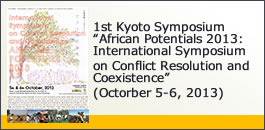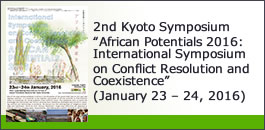[23rd Public Workshop / 13th Meeting of Research Unit on Politics and International Relations] “Land and Agrarian Reform in Zimbabwe: Social and Structural Implications” (March 9, 2015)
Date: March 9 (Monday), 2015, 16:00 – 18:00
Venue: Collaboration room 1 on the 4th floor, Building 18, Komaba Campus, The University of Tokyo
Co-organized by
-Kanto branch of Japan Association for African Studies (JAAS-Kanto)
-Graduate Program on Human Security (HSP), The University of Tokyo
-Center for African Studies, Institute for Advanced Global Studies (IAGS)
Program
Title: Land and Agrarian Reform in Zimbabwe: Social and Structural Implications
Presenter: Prof. Sam Moyo (Executive Director of African Institute for Agrarian Studies, Zimbabwe & Visiting Professor at Kyoto University)
Moderator: Prof. Yoichi Mine (Doshisha University)
Abstract
Thirty years of land reform, including the fast track programme of 2000, unraveled the settler-colonial ‘labour reserve’ of Zimbabwe. It redistributed 90% of the land held in 1980 by 6000 large-scale white farmers to about 300 000 black owned farming units by 2014. A tri-modal agrarian structure, consisting of an expanded peasantry, numerous small and medium sized capitalist farms, and large-scale agroindustrial estates, has been established. Agrarian production and societal relations are now based on relatively more equitable relations of land ownership; differentiated forms of integration into domestic and external markets to sale food and commodities; varied forms of family and wage labour relations; and varied accumulation strategies, reflected in capital formation and non-farm investments. Zimbabwe is unique in that it has rowed against the current trend of foreign land grabbing and challenging the contemporary scramble for Africa, but whether it can sustain an introverted process of accumulation ‘from below’ is an open question. The emerging contradictions include new forms of labour exploitation, the incipience of informal land markets, the renewed dominance of exports such as tobacco, cotton, sugar and tea at the expense of food grains, and the re-insertion of finance capital through export-oriented contract farming and expensive credit.
[5th Seminar on Conflict and Coexistence in Africa] (May 16, 2015)
Date: May 16, 2015. 10:30-11:40
Venue: Small-sized seminar room II, 3F Inamori Foundation Memorial Bldg., Kyoto University
Program
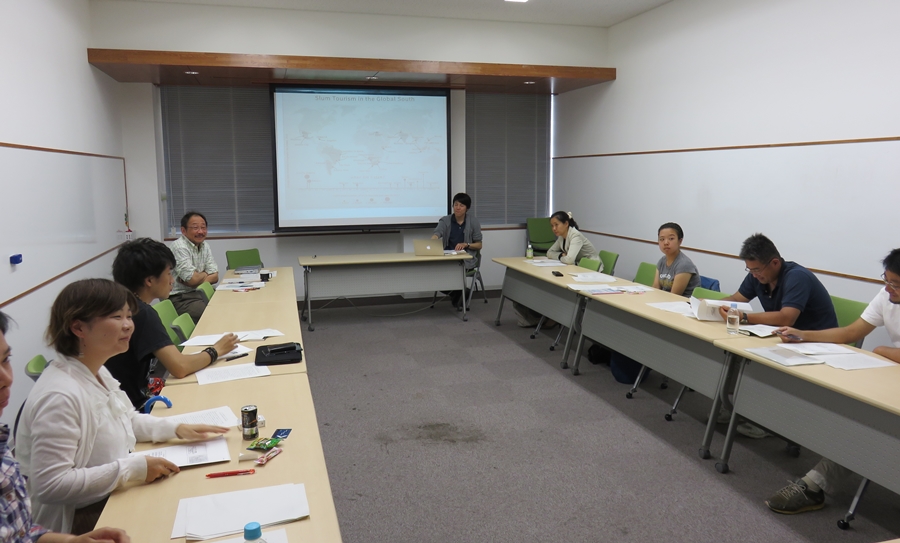
10:30-10:40
OHTA Itaru (Kyoto University)
Introduction
10:40-11:10
MATSUMOTO Tomoko (Nagoya University)
Change of Islamic education in Senegal society: A case study of Franco-Arab school
11:10-11:40
YAGI Tosuke (Ritsumeikan University)
Anthropological Study of Slum Tourism in Africa: With special reference to ‘Commercialized Persona’
Summary
Change of Islamic education in Senegal society: A case study of Franco-Arab school
MATSUMOTO Tomoko (Nagoya University)
Senegal has stated the principle of separation of government and religion in the constitution since its independence in 1960. Therefore, the secular curriculum, which French colonial government introduced, has been taking over in the official educational system even though the majority of people were Muslim. However, since 2002, public “Franco-Arab schools”, which implemented the bilingual education with French and Arab, have been constructing, and the number of school has been increasing up to now. In 2004 of the era of President Wade, Islam was introduced in the official curriculum according to the Amendment of Presidential Decree. Private “Franco-Arab schools” introduce official curriculum or develop appropriate education facilities because they want to be authorized by the government. Furthermore, the policy of modernization of “Daara” exists, which is Senegalese traditional Koranic School. The government wants to deal the number of participants in Daara as the number of students of official schools. These surrounding changes of Islamic education may affect on educational way; it has been situated in the informal sector and been well organizing and systemizing by Islamic Sufi leaders for a long time.
In this presentation, the change of Islamic education due to the introduction of Islam into the official curriculum will be discussed with a case of “Franco-Arab primary school.” The presenter did two field researches in 2014 and 2015 at two public and two private schools in Kaffrine and Kaolack regions. Interviews with students, parents, teachers and inspectors were conducted as well as collecting of related documents. After that, qualitative analysis on the change of traditional Islamic education was done with aspects of the educational system, students’ and parents’ expectations for Franco-Arab schools, and the change of their attitude towards Islamic education.
At public Franco-Arab primary schools, the curriculum, the textbooks and the examination system have been upgrading to some extent. The majority of students went on to the junior high schools in 2014 thanks to the policy with that they can go on to the junior high schools even if they cannot succeed in the examination of certificate of primary level. On the other hand, private schools are divided into the ones, which are deploying their own curriculum, and the others, which are following the government curriculum. Both of them tend to hope to be authorized by the government. The average age of students at private schools is higher than the public schools because they pass by Daara before entering into the primary school and come back to the schools after the experience of working, the marriage and the birth. This tells that the positioning of private Franco-Arab schools is different from the public ones.
Both students and parents at public and private schools expect at first to become a good Muslim through the school education. They prioritize to develop the basic human aspects as Muslim and follow the knowledge to survive in the life such as French and other secular subjects. Some students and teachers of private schools are living in the site of schools and being looked after by the Islamic leader. They seem to understand that the education is one of Islamic practices.
Franco-Arab schools are responding to the needs of people because they can learn Islam and the knowledge for the life at school. The number of students of Franco-Arab schools has increased and some of them are observed no to go to Daara or Arab school before entering to the primary schools. Further, the official curriculum and pedagogy are different from the traditional Islamic education institution.
Anthropological Study of Slum Tourism in Africa: With special reference to ‘Commercialized Persona’
YAGI Tosuke (Ritsumeikan University)
In the 1990s, slum tour in which people experience ‘slum culture’ in slums of the Global South began. There are several reasons why the slum tour has developed in the third world countries: 1) they are less expensive. 2) It develops pro-poor tourism aimed at poverty reduction. Until now, studies about slum tourism concentrate on 3 arguments: 1) motives of tourists. 2) A change of the recognition of tourists to slum culture through the slum experience. 3) The tourism development by country, an international organization and NGO. Arguments about inhabitants’ practice have had no place in these researches, therefore this research focuses on how people accept or cope with slum tour. On how they create a social space of their own for becoming a tourist attraction. The research was conducted on Nairobi, Johannesburg and Cape Town to understand the characteristic of slum tours. I investigated differences about the relation between inhabitants and tourists among three research areas.
First, I describe the contents of slum tour in Nairobi, Johannesburg and Cape Town and then analyze relationship between tourists and inhabitants in their areas. The standardization of tour content was seen in most companies in South Africa, and a place for sightseeing and the route that tourists visited were limited to the sites related to apartheid. In contrast, a lot of tours by “the informal sector” have been developed in Kenya. Therefore, there is possibility that slum tour is carried out in their private space of slum inhabitants, and their areas have accidental encounters between inhabitants and the tour.
I focus on ‘commodified persona’ that is created expediency to present their ‘culture’ for tourists in order to protect their life-world from drastic change by the tourism. The people living in multi-ethnic area such as slum not only manipulate ‘persona’ for tourists but also maintain a good relationship among the different ethnic groups. In this research, I focus on how they apply their daily practices of manipulating persona to tourism and how they re-establish their ‘life-world’ through the tourism. I would like to argue the ethic of slum tourism from the views of slum inhabitants.
[22nd Public Workshop / 6th Meeting of Research Cluster on Northeast Africa]“Agricultural innovation and participatory approach” (November 25, 2014)
Date: November 25, 2014. 10:00-17:00
Venue: Large-sized seminar room, 3F Inamori Center, Kawabata Campus, Kyoto University
Abstract
This symposium is aimed to discuss researcher-farmer linkages and the effectiveness and institutionalization of participatory approach in the agricultural research through practical experiences of participatory research cases.
In this symposium, four Ethiopian scholars working in the Farmers Research Group (FRG) project will report their activities and Japanese researchers bring the case studies in Asia including Japan as well as other African countries. We hope to make a general discussion on the topics such as the effectiveness of participatory approach and its institutionalization.
We welcome practitioners, researchers, students and all those who are interested in Agricultural development and research in Africa.
Program
10:00
Opening
Moderator: Yoshimasa Ito (Kyoto University)
Opening Address: Kiyoshi Shiratori (JICA)
10:10
First session;“Participatory approach and agricultural technology development”
Moderator: Papa Saliou SARR(Kyoto University)
1-1. “Farmers Participatory Research on Teff, Haricot bean and Wheat Production Technology Improvements in Wolaita Zone, South Ethiopia”
Fanuel Laekemariam (Wolaita Sodo University)
1-2. “Revaluation of local traditional varieties and development of new varieties of chili pepper for the promotion of agriculture at Hilly and Mountainous Areas in Nagano, Japan”
Kenichi Matsushima (Shinshu University)
1-3. “Expected role of area study for ideal community based development: An example of soil erosion countermeasures in Western Kenya”
Yuko Yamane (Nagoya University)
1-4. “Practice-oriented area studies in Bangladesh”
Kazuo Ando (Kyoto University)
12:10
Lunch Break
13:30
Second session; “Institutionalization of participatory research approach”
Moderator: Feleke Woldeyes Gamo (Arba Minch University)
2-1. “Farmer Research Group (FRG) Approach Training for researchers at Adami Tulu Agricultural Research Centre, Oromia”
Kedir Wako (Adami Tulu Agricultural Research Centre, Oromia Agricultural Research Institute)
2-2. “Participatory Research in Amhara Region: Status and Challenges” Tilaye Teklewold (Amhara Agricultural Research Institute)
2-3. “Present status of agricultural research and participatory approach in Ethiopia”
Dawit Alemu (Ethiopian Institute of Agricultural Research)
2-4. “Contribution to Farmers through collaboration between research and extension in Afghanistan”
Masaaki Suzuki (JICA Capacity Development and Institutional Strengthening of the Ministry of Agriculture, Irrigation and Livestock)
15:30
Coffee Break
16:00
Third session; “Discussions: “How we can make participatory approach functional”
Chairperson: Masayoshi Shigeta (Kyoto University)
Comment: Shigeru Araki (Kyoto University)
17:00 Close
Co-Organized by:
– JICA and The Center for African Area Studies, Kyoto University
– The Grant in Aid for Scientific Research (A) Project: Engaged Area Studies in the Arena of African Local-Knowledge Formation and Sharing: Seeking for the new images of community
– The Grant in Aid for Scientific Research (S) Project: Comprehensive Area Studies on Coexistence and Conflict Resolution Realizing the African Potentials
[21st Public Workshop / 10th Meeting of Research Cluster on West Africa / 11th Meeting of Research Unit on Politics and International Relations] “Informalization and Its Discontents & Violent Islamic Radicalization” (Co- organized by the 29th Kyoto University African Studies Seminar (KUASS)) (November 21, 2014)
Date: November 21, 2014. 14:00-17:00
Venue: Middle-sized seminar room, 3F Inamori Center, Kyoto University
Program
Prof Abdul Raufu Mustapha (Oxford University)
Violent Islamic Radicalization:Northern Nigeria in the light of the experience of southern Niger Republic
Kate Meagher (London School of Economics)
Informalization and Its Discontents: The Informal Economy and Islamic Radicalization in Northern Nigeria
Abstract
Mustapha, A. Raufu
Violent Islamic Radicalization: Northern Nigeria in the light of the experience of southern Niger Republic
At first glance, northern Nigeria and southern Niger Republic share a number of important religious, economic, and social characteristics.
- Both belong to the sahelian cultural belt just south of the Sahara, running from Senegal to Somalia; a zone in which Islam has exercised significant influence for over a thousand years.
- The two regions are also united by the prevalence the Hausa language.
- Both are regrettably regions of high levels of poverty and depressed socio-economic indicators.
- Finally, they both share a complex admixture of sectarian communities of Sufi Brotherhoods and reformist strands of Islam.
Since the early 19th century, religious and political ideas, religious groups, economic actors, and political forces have moved back and forth across the boundary between both regions. In the process, events in one region have tended to have ramifications for developments in the other. For instance, the Sokoto jihad of 1804 spread Qadiriyya Brotherhood influence to the territories that are now in Niger Republic and many ‘of the wealthiest merchants of Niger belong to this order, whose members are referred to locally as ‘yan sadalu’. Similarly, the Tijaniyya-Ibrahimiyya Brotherhood was spread from Kano to Niger in the 1950s and its members are known locally as the ‘yan kabalu’. Significantly, the Qadiriyya-Tijaniyya conflicts which racked Nigeria in the 1950s and 1960s also took place in Niger. In the same vein, the reformist Salafist Nigerian sect, Izala, also made an appearance in Niger Republic in the 1980s, having been formed in Nigeria. As in Nigeria, the appearance of this reformist Salafist sect generated high levels of religious discord with the established Sufis in Niger. And as happened in Nigeria, Izala also broke into two main factions.
Though the flow and ebb of ideas and people go in both directions, there is the recognition of Nigeria’s formidable cultural, religious, and economic influence on Niger. This is captured in the Nigerien saying: ‘When Nigeria has a cold, Niger coughs’.
Since 2009, northern Nigeria has been battling a stubborn Islamist insurgency spear-headed by the Boko Haram. Analysts have been speculating on the possible consequence of this insurgency for Niger Republic, given the shared characteristics between both regions. Why has there not been the development of a similar insurgency in Niger? This lecture reflects on this question. The lecture compares the drivers of possible radicalization in both regions, looking specifically at: (a) the variable cultural geographies of within and between the two region; (b) impact of historical forces; (c) the importance of economic processes; (d) the political and administrative dynamics in both regions; and (e) religious factors, especially the place of Christianity in both regions and the prevalence of some religious ideas such as secularism. Through such a comparison, it should become clearer why, despite their seeming similarities, violent Islamist radicalization remains dormant in southern Niger but active in northern Nigeria.
Meagher, K.M.B. Kelly (London School of Economics)
Informalization and Its Discontents: The Informal Economy and Islamic Radicalization in Northern Nigeria
This seminar explores the dark side of inclusive markets in the context of northern Nigeria. It examines how strategies of economic inclusion generate new dynamics of exclusion through processes of selective inclusion and marginalization. Despite the celebrated resurgence of the Nigerian economy, the majority of the population has remained trapped in the realities of jobless growth, rising poverty and expanding economic informality. The interface of historical disadvantage, economic reforms, and the dynamics of the global economy have exacerbated problems of regional inequality within Nigeria, concentrating the benefits of inclusive markets in the south and the negative side-effects in the northern region of the country, fostering escalating poverty, disaffection and Islamic extremism.
Drawing on fieldwork conducted in the northern Nigerian cities of Kano and Kaduna in 2014, I will explore the nature and limitations of inclusive economies within the context of northern Nigeria’s vibrant informal economy. I will focus on how inclusive economies have exacerbated economic stress within northern Nigeria, and generated new and increasingly problematic processes of exclusion. Based on interviews with operators and associational leaders in a selection of eight common informal production and service activities, I show how mounting economic pressures are restructuring patterns of ownership, social identity, educational attainment and religious affiliation within the informal economy. Indigenous institutions and networks of religious tolerance and economic interdependence are being eroded by new patterns of competition over access to informal jobs based on education and identity. Popular disaffection is heightened by human rights abuses by security forces and graduate employment programmes, which further marginalize poor and less-educated informal actors, exacerbating economic stress and resentment against the state, and creating a tinderbox for violence and Islamic extremism.
[20th Public Workshop / 7th Meeting of Cluster on Southern Africa] “Long-term field study of ring-tailed lemurs in southern Madagascar” (Co-organized by the 206th Regular Seminar of the Center for African Area Studies) (November 20, 2014)
Date: November 20, 2014. 15:00 – 17:00
Venue: Middle-sized seminar room, 3F Inamori Center, Kyoto University
Program
Title: Long-term field study of ring-tailed lemurs in southern Madagascar
Presenter: Shinichiro Ichino (Kyoto University)
Abstract
Madagascar is a large island which is 1.6 times larger than the whole area of Japan and characterized by biodiversity with high endemism. In spite of that, it is estimated that Madagascar has lost more than 90% of its original forest. At Berenty Reserve in southern Madagascar, a field study of a diurnal prosimian, ring-tailed lemurs (Lemur catta), has been conducted since 1989. In this presentation, I introduce results of the long-term study; for example, longevity, life history traits and population dynamics of this endangered species. And I also discuss how long-term field study can contribute to forest ecosystem conservation in Madagascar.
[19th Public Workshop / 13th Meeting of Research Unit on Culture and Society] “Ukuringa’-The role of language in negotiating male youth township identity on a south African street corner” Idah Makukule (Public Affairs Research Institute, South Africa, Researcher) (Co-hosted with 25th Kyoto University African Studies Seminar (KUASS), May 26, 2014)
Date: 15:00-17:00, 26 May 2014
Venue: Small Seminar RoomRoom , Inamori Foundation Memorial Bldg. (Inamori Center), Kyoto University
Title: Ukuringa’ -The role of language in negotiating male youth township identity on a south African street corner
Speaker: Idah Makukule (Public Affairs Research Institute, South Africa, Researcher)
Abstract
[18th Public Workshop / 7th Meeting of West Africa Research Cluster] Prof. Murray Last “The Dilemma in Being an Islamic Radical in Northern Nigeria: Whether Non-violent or Violent” (Co-hosted with 24th Kyoto University African Studies Seminar (KUASS), May 20, 2014)
Date: May 20, 2014 15:00-17:00
Venue: Room #318, Inamori Foundation Memorial Bldg. (Inamori Center), Kyoto University
Program
Title: The Dilemma in Being an Islamic Radical in Northern Nigeria: Whether Non-violent or Violent
Speaker: Prof. Murray Last (University of London, Professor emeritus)
Abstract
PDF>>[4th Seminar on Conflict and Coexistence in Africa] (May 10, 2014)
Date: May 10, 2014. 15:30-17:00
Venue: Room #318, Inamori Foundation Memorial Bldg.(Inamori Center), Kyoto University
Program
15:30-16:00
KATAYAMA Natsuki (University of Tokyo)
Reconciliation after Rwandan Mass Violence
16:00-16:30
YAMAMOTO Meyu (Kyoto University)
Black, Non-Black, or Honorary White? : Identity Construction of the Chinese Diaspora in the post-Apartheid South Africa
16:30-17:00
IKENAGA Inaki (Kobe University)
Two Social Combinations of Senegalese Street Vendors: Dahira and Professional Association
[17th Public Workshop / 6th Meeting of Cluster on Southern Africa] “Tobacco and Health: An Overview of Tobacco Control in Zambia” Richard Zulu(University of Zambia) (January 10, 2014)
Date: January 10, 2014, 15:00 – 17:00
Venue: #318 seminar room, Inamori Center 3F
Program
15:00 – 17:00 Richard Zulu (University of Zambia)
“Tobacco and Health: An Overview of Tobacco Control in Zambia”
Abstract
Tobacco is a major public health concern worldwide and a major leading cause of preventable deaths. Methods used are review of survey results from the 2002, 2007 and 2011 Global Youth Tobacco Survey (GYTS) and a desk review. The GYTS included school grades 7, 8 and 9. The never smokers likely to initiate smoking in the next year were 22.6%. About 19.1% of the students had ever smoked cigarettes. About 22% of students reported that one or more of their parents smoke. Among some of the students who were current smokers some reported wanting a cigarette first thing in the morning, an indicator of nicotine addiction. Some students reported being offered free cigarettes by a tobacco company representative. Zambia has made tobacco use prevention a primary health issue as evidenced by the ratification of the World Health Organization (WHO) Framework Convention on Tobacco Control (FCTC) on 28th May 2008. There is need to have a comprehensive tobacco control law which is FCTC compliant. Findings presented in this paper show that there is need for interventions towards tobacco control amongst young people who represent the ages of tobacco use initiation.
[16th Public Workshop] “Diversity and Perspectives of Contemporary African Area Studies” (Co-organized by the 200th Regular Seminar of the Center for African Area Studies) (December 19, 2013)
Date: December 19, 2013. 15:00 – 17:00
Venue: Inamori Foundation Memorial Bldg, Large-sized Meeting Room, Kyoto University
Program
“From study of African languages to that of African minds”
Shigeki Kaji (Kyoto University)
“Interests and surprises in African nature”
Kazuharu Mizuno (Kyoto University)
“Conflict resolution and realizing coexistence in Africa”
Itaru Ohta (Kyoto University)
“20 years of suburban villages in northern Tanzania”
Jun Ikeno (Kyoto University)
Discussant
Mitsuo Ichikawa (Kyoto University / Japan Monkey Center)
Summary
There are diverse approaches for understanding contemporary Africa and African area studies have been developing with the diversity. This workshop is the 200th memorial workshop in a series of the regular public seminar of the Center for African Area Studies (CAAS) which has continued since 1986. In this workshop, four researchers from the CAAS have talked about own notion of African area studies on the basis of their own experiences of field research and, with a discussant, discussed the future perspectives of African area studies.

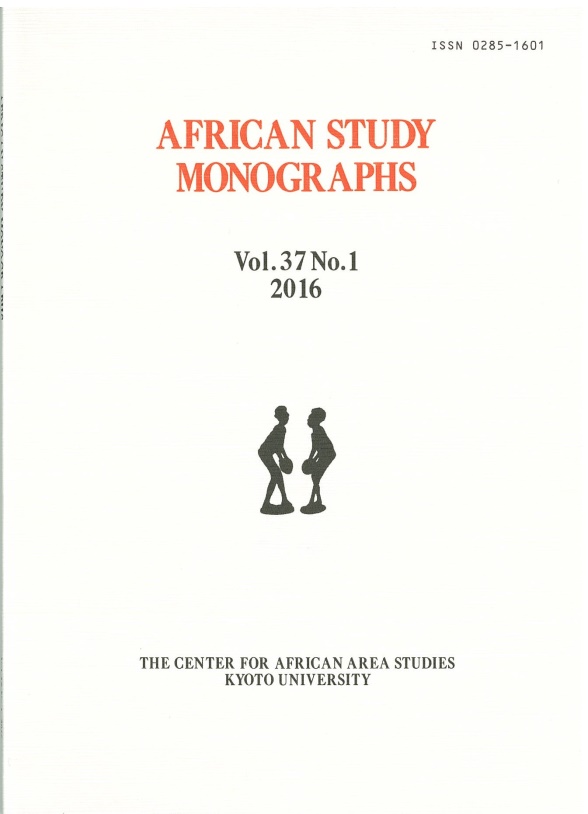
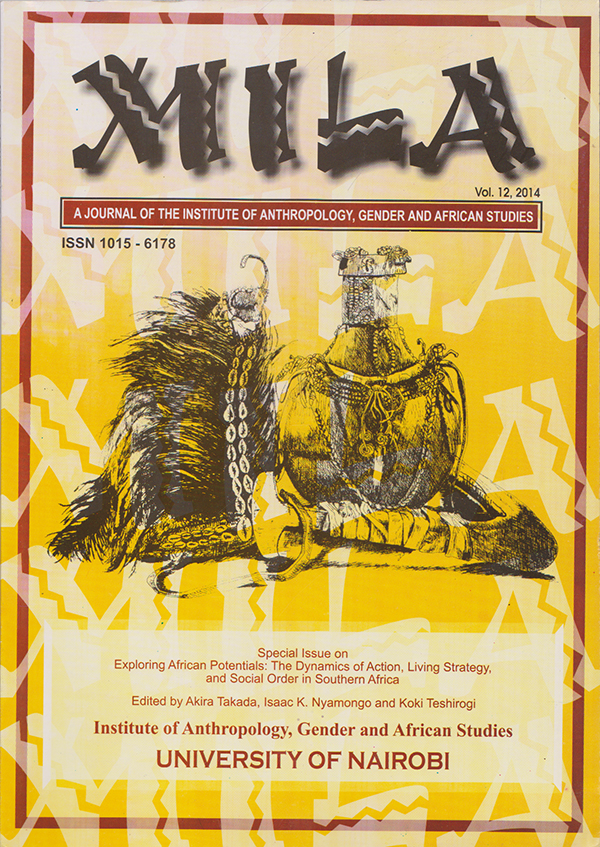 Exploring African Potentials, Mila Special Issue
Exploring African Potentials, Mila Special Issue